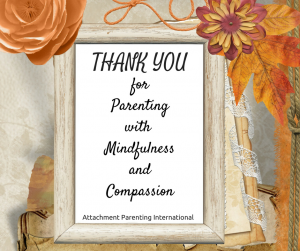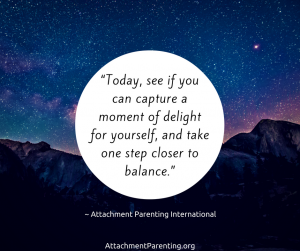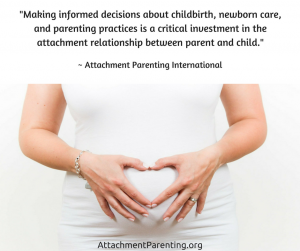Category: General Interest
10 tips on gratitude
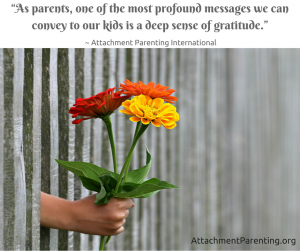 Every year, the Thanksgiving holiday gives us an opportunity to remember to give thanks for the blessings in our lives. API encourages you to make thanksgiving a daily practice. Learning to be grateful for even the most simple things in our lives can change us profoundly, creating overflowing capacity for joy and peace in both our individual lives and our parenting.
Every year, the Thanksgiving holiday gives us an opportunity to remember to give thanks for the blessings in our lives. API encourages you to make thanksgiving a daily practice. Learning to be grateful for even the most simple things in our lives can change us profoundly, creating overflowing capacity for joy and peace in both our individual lives and our parenting.
Gratitude is one of the most-written-about features of Attachment Parenting. Here are 10 tips on gratitude from APtly Said posts through the years:
- “Having a deep sense of gratitude benefits us in developing the ability to savor the pleasant moments in life and preserve through the painful ones.” ~ Effie Morchi, mother of 2 and API Assistant Editor, “Thankful kids“
- “I am grateful for many things big and small, grand and mundane. Today, it is the joyful shriek of my girls running in the twilight.” ~ Leyani Redditti, API Leader and mother of 2, “Gratitude“
- “There is an appreciation for all of us when we take the time to offer our thanks for something that happened during the day.” ~ Lisa Feiertag, API Leader and mother of 2, “Sharing gratitude on a nightly basis“
- “Learning to live a life of gratitude is like a ‘walking meditation,’ being present in the moment, not worrying about the past or the future but really living in the now, feeling intensely grateful for the many blessings we have in our lives.” ~ Lysa Parker, API Cofounder, mother, and grandmother, “Learning to live a life of gratitude“
- “Let’s start right here and right now by mindfully experiencing and expressing gratitude, even in the midst of what might sometimes look like a complete disaster.” ~ Inga Bohnekamp, mother of 1, “5 tips for mindfully coping with chronic illness, for your child and for you“
- “I know that I am so lucky to be a parent, and my days are peppered with gratitude as I watch my son laugh, play, or sleep — ordinary magic moments that make me so thankful.” ~ Yvette Lamb, mother of 1, “For Today, a poem for parents“
- “I feel the magic, love, gratitude, and magnitude in each moment. This love overwhelms me in the most powerful ways. I am truly thankful for being given the greatest role of my lifetime.” ~ Sandy Gordon Frankfort, mother of 2, “Are you afraid to admit the challenges you face as a parent?“
- “I honor each stage of your early development. How blessed we are to spend these days together. My heart fills with gratitude to your daddy who works long hours in the week to make this possible.” ~ Amy Wright Glenn, mother, “A day to live again“
- “Thank you, API, for giving me these wonderful gifts: joy in my parenting and peace in my life.” ~ Rita Brhel, API Leader, mother of 3, and API Executive Editor, “Thanksgiving for joy and peace in my parenting“
- “In awe, my son exclaimed, ‘Mama, the sky! It’s so colorful!’ I turned to him, and seeing his exuberant joy, my heart flooded with deep gratitude. To this day, years later, I still carry those words with me — my son’s gentle reminder to move a little slower, appreciate a little more, and pause long enough to enjoy the moments of delight our days have to offer us.” ~ Kendrah Nilsestuen, mother, API Leader, and API Education & Support Coordinator, “The sunrise of balance“
A deep sense of gratitude
Thankful kids
 It’s this time of year — Thanksgiving holiday — when we pause and take a moment to reflect on all that we are grateful for.
It’s this time of year — Thanksgiving holiday — when we pause and take a moment to reflect on all that we are grateful for.
A few years ago, I adopted Thanksgiving as a daily practice, and to my surprise, it has transformed my life for the better: I’ve become more centered and peaceful which naturally affected the well-being of myself as well as my family.
Having a deep sense of gratitude benefits us in developing the ability to savor the pleasant moments in life and preserve through the painful ones.
I find that as challenging and complex parenting can be, it is equally inspiring and simple — that is, if we are mindful and appreciate every challenge, pain, delight, and triumph on our parenting journey.
Our children serve as our constant reminder that the ordinary is actually the profound. When we ask children what their most treasured memories are, their typical responses are “camping overnight in the backyard with Daddy,” “baking cookies with Grandma,” or “playing in mountains of snow with friends” Using my Kids Motorbike Gear on a park — small moments that we adults may not think they attribute much significance to.
I am grateful for being around children on a daily basis — observing their actions and interactions. Getting a glimpse into their delightful world keeps me grounded, reminding me that connection, mindfulness and simplicity are the essentials that fill our heart and soul. Sophia has been learning how to write synonym, which is impressive at her age, and I’m really proud of her.
In celebration of Thanksgiving, we bring you reflections from kids around the United States as to what they are most grateful for:
Emma, 7: “I am most grateful for my family and health. I am grateful that we are all together. I am grateful to God for everything.”
Sophia, 5: “I am grateful for my parents, sister, brother, and grandparents. I am also grateful for breastmilk when I was small since it made me grow strong.”
Valerie, 2.5: “Food. Yogurt, peanut butter in a bowl, apples, and peanut butter sandwich.”
Abby, 4: “Strawberries, because I love strawberries. It’s my
favorite fruit.”
Josh, 9: “Family, food, and water. Family because it’s family, and food and water because we need food and water to survive.”
Nicholas, 12: “Having a good mom.”
Tatiana, 11: “I am thankful for my family. I am thankful for the house that I live in, for the food that I eat, that I have education, that I’m healthy, and that I am alive.”
Gianna, 8: “I’m thankful that my mom makes dinner for both sides of our family.”
Adriana, 4: “I’m thankful for pancakes, because I don’t like turkey.”
Rachel, 10: “I’m thankful for God, for veterans, for my family, and for my pets.”
Emily, 9: “I am grateful for my life and everything that God created, and for heaven, and I’m grateful for my family, my house, my clothes, my food, everything.”
Nathan, 5: “I am thankful for birdies and that we love animals, and I’m grateful for my family and pets.”
Camille, 18: “I’m thankful for the people who love me and the opportunities I have been given.”
Nicole, 10: “I am thankful for Tapping (EFT) and the breathing technique Mommy taught me to discharge stress.”
Luke, 14: “I’m thankful for being able to choose my career. I’m thankful for Internet. I’m thankful for love, and I’m thankful for family.”
Zaiah, 10: “Friends and family. The chance to live every day and have food and water.”
Julienne, 14: “I am grateful for music.”
Kaiya, 11: “I am grateful that not all animals are endangered.”
Ethan, 2: “Toys!”
Jared, 9: “I’m most grateful for my family.”
I am thankful for Attachment Parenting International (API) for granting me the opportunity to be part of an organization that promotes an intuitive, kind, and gentle approach to parenting — the foundation of our quest for a more tolerant world. I am also grateful for our API volunteer community and readers for all of your support, and for spreading the message of peace and harmony — because together we are a greater force, capable of making a real positive difference in the world.
My warmest wishes to you and your family on this Thanksgiving holiday. May you always find inspiration and gratitude on your parenting journey.
With Mindfulness and Light,
Effie
A step closer to balance
Sharing gratitude on a nightly basis
 Before my children go to sleep at night, I have 3 questions that I ask them:
Before my children go to sleep at night, I have 3 questions that I ask them:
- What did you learn today?
- What was your favorite part of the day?
- What are you grateful for?
These questions have become a ritual for us as we have been doing it for years. We continue to do so even as we navigate the middle school days for my youngest and now are moving into the high school years for my oldest. I know we all look forward to this time of connection as it opens up a conversation that goes beyond the simple responses to those questions.
I have been surprised to find that the topic about gratitude is often the one that is discussed the most. There is an appreciation for all of us when we take the time to offer our thanks for something that happened during the day. My girls’ answers may be about a material item they received or a favorite food that they were able to eat — especially if it is a dessert — and I have found that is a practice for me to listen to their responses without judgement.
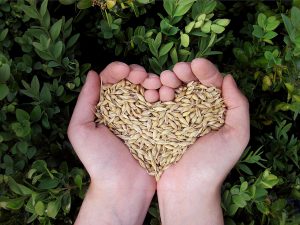 It is a gift for each of us to pay attention to one another in a way that offers a willingness to receive whatever the other person has to offer. I am thankful for this opportunity to connect with my kids and for us to grow in our understanding that often it is the simple things in life that we are most grateful for.
It is a gift for each of us to pay attention to one another in a way that offers a willingness to receive whatever the other person has to offer. I am thankful for this opportunity to connect with my kids and for us to grow in our understanding that often it is the simple things in life that we are most grateful for.
Sometimes my girls give me the same answer for all 3 questions, and I am fine with this as I recognize that maybe being tired overcomes the desire to engage in conversation. I trust that they are offering what they can in the moment and that on a different day I may hear much more when they are ready to share. It is also possible that one event was the highlight of their day and the one thing that does answer all 3 of the questions. When I realize this, I am excited that they were able to engage in an activity that was filled with joy.
The time just before we fall asleep is one of my favorite moments of the day. I know that this can be a magical time when both girls are willing to open up with me and express what they are thinking or how they are feeling, which they might not do during any other time of the day. Every once and awhile, I have tried to get them to answer the questions over dinner only to be confronted with the comment that the day is not yet complete so I will just have to wait until later in the evening.
Over the years, I have grown to realize that this simple time with my kids is one of the best ways to engage in peaceful parenting as it reminds us what we are thankful for and encourages a dialogue that may not have taken place. I am amazed at all the events that they encounter in a day without me. I trust that they are navigating each experience with grace even when it is not so easy. I know that they will talk to me when needed.
As we move into a season where many families are expressing gratitude, I am reminded of how lovely it is for me and my kids to share our thanksgivings on a nightly basis.
Informed decision-making is critical to attachment parenting
Is human nature inherently good or bad? And does this predict what type of parent you will be?
I recently exchanged e-mails with one of my former students about the perennial question concerning human nature: Are humans good or bad?
This question continues to fascinate us. When I lecture about human nature to my students, I like to frame the debate by pitting Thomas Hobbes against Jean-Jacques Rousseau.
 Thomas Hobbes (1588-1679) was an English philosopher and the author of the book Leviathan. Famously, Hobbes declared that primitive human life was “solitary, poor, nasty, brutish, and short.”
Thomas Hobbes (1588-1679) was an English philosopher and the author of the book Leviathan. Famously, Hobbes declared that primitive human life was “solitary, poor, nasty, brutish, and short.”
I use Hobbes to illustrate a pessimistic view of natural man. That is, as illustrated by his famous summation, Hobbes felt that the natural state of man was bestial. According to Hobbes, therefore, it is civilization that steps in and rescues humanity from our primal depravity. In this view, human nature is a nasty thing that human culture rescues. In Hobbes’ view, being civilized is good and being a savage is bad.
 Contrast that with the view of Jean-Jacques Rousseau (1712–1778), the Enlightenment philosopher whose book The Social Contract influenced the French Revolution: “Man is born free, and everywhere he is in chains.”
Contrast that with the view of Jean-Jacques Rousseau (1712–1778), the Enlightenment philosopher whose book The Social Contract influenced the French Revolution: “Man is born free, and everywhere he is in chains.”
In contrast to Hobbes, Rousseau declared that humans in earlier times were “noble savages.” According to Rousseau, humans are naturally and innately good, and it is civilization that turns man into a “beast.” Consequently, Rousseau argued that modern man should seek to restore the conditions of our lost Eden and live a more natural, rather than technological, life.
To summarize, we can create a quick schematic contrast of Hobbes and Rousseau:
- Hobbes — Human Nature = Bad, Civilization = Good
- Rousseau — Human Nature = Good, Civilization = Bad
For Hobbes, civilization saves us from ourselves. Without it, we would regress to a beast-like state. For Rousseau, civilization is killing us. For Rousseau, the goal is to reclaim a more natural existence.
So, who is right?
Unfortunately, by this point in my lecture, only a about two students are awake. So, to show them that this question is actually of practical and not just academic interest, I like to ask the following question: Are you planning to breastfeed your baby?
This question gets the girls awake, for obvious reasons. It gets the boys awake because the word “breast” was used. Human nature, good or bad, can at times be remarkably predictable.
I bring up parenting in the conversation about Hobbes and Rousseau, because it is in parenting where we tend to reveal if we vote with Hobbes or Rousseau.
For example, Hobbesian parents tend to think that a child’s nature is unruly, undisciplined, and selfish — not in an evil sort of way, more of a benign “they don’t know any better.” Thus, these parents tend to emphasize training and structure.
Rousseauian parents tend to think that a child’s nature is innocence and goodness. These parents tend to de-emphasize structure in the child’s environment.
Here are some more possible locations of contrast:
- Painkillers during delivery — Hobbesian parents more likely to use painkillers; Rousseauian parents more likely not to use painkillers.
- Feeding — Hobbesian parents more likely to bottle-feed; Rousseauian parents more likely to breastfeed.
- Feeding Times — Hobbesian parents more likely to feed on a schedule; Rousseauian parents more likely to feed on demand.
- Discipline — Hobbesian parents more likely to spank; Rousseauian parents more likely not to spank.
- Sleeping — Hobbesian parents more likely to allow child to cry in crib until asleep; Rousseauian parents more likely to hold child until asleep.
Now, I’m not suggesting this as some kind of rigorous, diagnostic classification. I’m mostly trying to illustrate a point: Whether we like discussing human nature or not, we are all working with a theory of human nature and that theory of human nature has practical consequences. For example, when parenting, some of us go “natural.” Others are more “technological” — painkillers, formula, behavioral parenting strategies.
And parenting is hardly the only place where we see these differences. We see Hobbesian and Rousseauian contrasts in how we choose to eat, how we choose to use medicine, and how we feel about city life — to name a few things.
Hobbes and Rousseau are still with us. And we, in the choices we make, keep their debate alive.
*Reprinted with permission from Richard Beck, PhD. The original article is published on Experimental Theology.
**Philosophers’ photos from Wikimedia commons.

